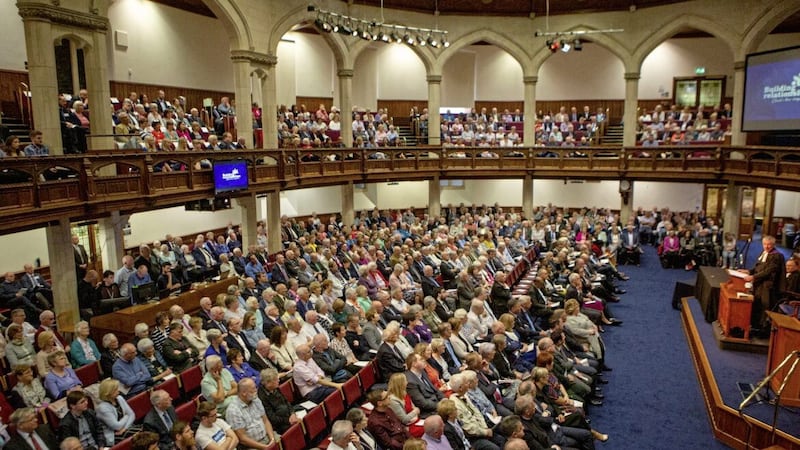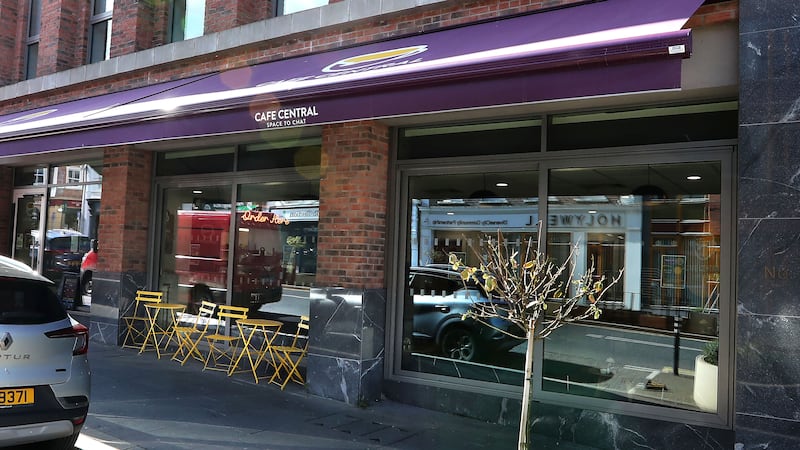THREE days of tea and tray bake-fuelled debate and decision-making will take place in Belfast this week when the Presbyterian Church holds its General Assembly.
Events open on Wednesday evening with a worship service and the traditional formalities around the new Moderator assuming his role. As in the Methodist Church with its President, a Presbyterian Moderator typically holds office for a year (Dr David Bruce's two years during the pandemic being an outlier).
The incoming Moderator is the Rev Dr Sam Mawhinney from the Adelaide Road congregation in Dublin, the first minister from the Republic to hold the role since Dr Trevor Morrow in 2000.
Thursday, Friday and Saturday are given over to the Assembly's business, which essentially consists of debating and voting on reports from the Church's various committees.
These are contained in a hefty volume solemnly known as 'The Blue Book'; perhaps rather disappointedly for fans of ecclesiastical intrigue, this title is not bestowed for some obscure liturgical or doctrinal reason but simply because blue is the colour of paper used for the book's cover...
This year's blue book is a whopper, weighing in at 416 pages, making it around 50 per cent bigger than the one that clergy and elders – lay people elected to help lead their congregations – worked through last year.
Almost 50 pages are given over to a report from the Reconfiguration of Ministry Task Group. This is billed as a 'green paper' because it represents "new and major work" that will require wider discussion over a period of time.
It's a candid piece of work with big implications for the future of the denomination. In many respects, it parallels last month's pastoral letter from Bishop Donal McKeown outlining the challenges and changes needed in response to the falling number of priests in the Diocese of Down and Connor.
In the Presbyterian case, a downward trend in church attendance, finances and clergy numbers has prompted it to consider radical action which could include closing and merging congregations while also seeking to 'plant' new ones.
An analysis of the Church membership highlights several weaknesses. Numbers are falling, the membership is getting older and Irish Presbyterians are overwhelmingly concentrated in Ulster.
In the 10 years up to 2020, the number of 'contributing families' has fallen by 20 per cent. In some areas it has collapsed – down by 41 per cent in north Belfast, 40 per cent in south Belfast and 30 per cent in Carrickfergus.
"The decline is greatest in Belfast, Down and Antrim; and least in the Republic of Ireland and west of the Bann," says the report. Worse, 2021 figures show a further 6.5 per cent decline in a single year.
"Not only are we a declining denomination, but we are also an ageing one," it acknowledges.
In the context of a growing population, this is clearly bad news for the Church. So too is the fact that by 2026 there will be "approximately 62 more vacancies than ministers to fill them... In denominational terms, one-sixth of charges will be vacant".
The report identifies an "over-reliance on ministers and other paid staff" in many congregations, which it says is "to the detriment of the ministry and mission of the Church".
Presbyterians need to act quickly and radically, says the task force, which proposes realigning presbyteries - groups of congregations, roughly akin to dioceses in the Catholic Church and Church of Ireland - by as early as next year.
The Church faces having to do five things at once "in the immediate future", the report says: "Close some churches; manage some declining churches which will reach the end of their life cycle; support other declining churches to grow again; support growing churches; plant new churches."
Having set out the need for action, it will be fascinating to see whether the Church at presbytery and congregation level is prepared to accept real change in the coming months and years, or if it will continue to manage decline.








